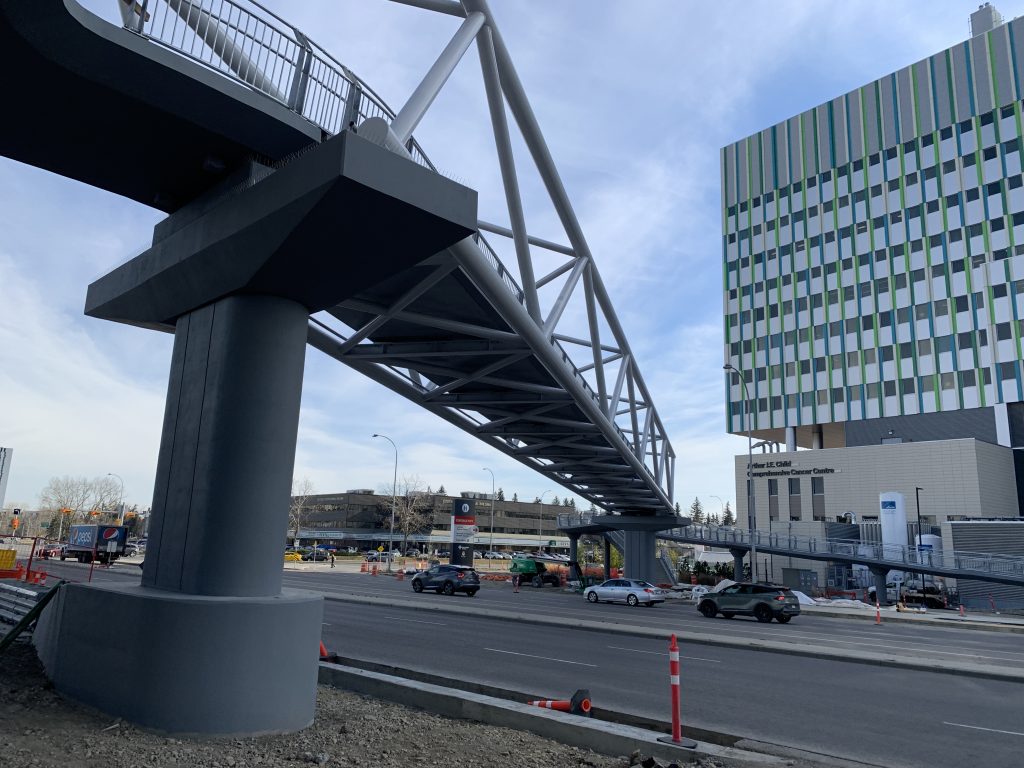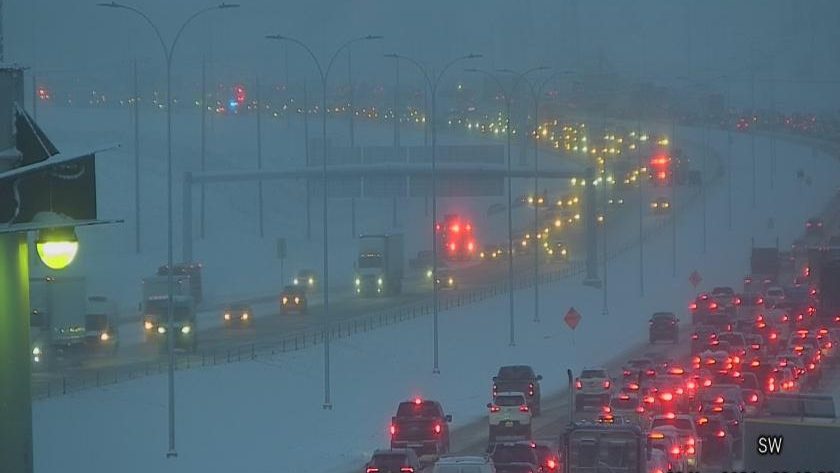Can Premier Kenney pressure President Biden to reverse course on Keystone XL?
Posted Jan 21, 2021 2:58 pm.
Last Updated Jan 21, 2021 3:06 pm.
CALGARY (660 NEWS) — Upon entering the White House for the first time as President of the United States of America, Joe Biden wasted no time getting to work as he signed several executive orders.
Seated at the same desk occupied by President Donald Trump for the last four years, Biden revoked a presidential permit for the Keystone XL pipelines. Trump had signed a permit okaying the pipeline, which would carry oil from Alberta down to the U.S. Gulf Coast, last July.
The decision had been rumoured a day before Biden’s inauguration in Washington D.C., sparking immediate reaction in Alberta where the provincial government had agreed to invest around $1.5 billion to ensure construction would continue.
Premier Jason Kenney did not mince words after Biden officially signed the order on Wednesday afternoon, holding a press conference where he suggested Canada should impose sanctions on the United States in response.
“It is an insult directed at the United States’ most important ally and trading partner on day one of a new administration,” Kenney said. “Let’s be clear about what happened today. The leader of our closet ally retroactively vetoed approval for a pipeline that already exists, and which is co-owned by a Canadian government, directly attacking by far the largest part of the Canada-U.S. trade relationship, which is our energy industry and exports.”
There are some who wish we would just give up our fight for pipelines, for oil & gas jobs, and for our broader energy sector.
Alberta will not surrender to those who want to landlock our energy.
We will defend this province's vital economic interests, as we were elected to do. pic.twitter.com/KboHzu4PbA
— Jason Kenney ???????????????????????? (@jkenney) January 21, 2021
Kenney said it was a “gut punch” and Canada should have been properly consulted first before the decision was made.
The suggestion of sanctions raised eyebrows around the province, and there is some speculation that they could even be imposed in a situation like this.
“I’m not sure what he was trying to accomplish, or maybe he was just venting,” said Lori Williams, a political scientist at Mount Royal University.
Williams said the Biden administration has a lot on their plate in the first days, and it is doubtful they would be receptive to concerns of a Canadian province while dealing with the COVID-19 crisis.
“It’s overwhelming the job they have before them,” she said. “Precisely because of the failure to effectively engage the pandemic in United States. Economically, in terms of health care, those are the absolutely pressing priorities. And there are political considerations.
“There is a wing of the Democratic Party that is strongly environmentalist.”
She speculated that Biden is likely receiving a lot of pressure from the progressive end of the party to cancel projects like Keystone and it would be a massive risk to him within his own borders to revoke on a promise he made a year ago.
It is possible the issue may be raised when Biden has his first call with a foreign leader, when he is scheduled to speak with Prime Minister Justin Trudeau on Friday
Williams said if the province does want to make a firm commitment towards ensuring construction, then the environmental issues being raised on both sides of the border must be addressed first.
Kenney said the economic impacts of the cancellation will be massive, along with causing a loss of thousands of jobs.
Economist Trevor Tombe said while there definitely will be some impacts in that department, the province also needs to keep a close watch on things they can control.
“I think what the premier is reflecting is a broader sense of frustration and disappointment, which is completely fair enough. What I don’t think is super productive is encouraging the federal government to ramp up the temperature,” Tombe said. “The government should focus on things that it can control, and that is at the moment the budget.”
Tombe said the pipeline will have implications on the budget in terms of the royalty revenue it could have generated, but otherwise Alberta will mainly be looking at debt impacts due to the lost investment.
On the issue of economic warfare in the form of sanctions, Tombe is also very pessimistic about that having any sort of possibility because the province doesn’t have much authority there.
“This is not a trade dispute, this is about an investment project not receiving approval,” he said. “We would not be permitted to retaliate with tariffs over this in the same way that we did with steel and aluminium. For us to go down that road, it would mean us starting a trade war, not responding to one started by the United States.”
Also at the centre of this issue, along with all the economic impacts and government posturing, are the workers who may be looking at less employment options with the cancellation. Kenney said 2,000 people lost their jobs with the announcement, and it would have created 59,000 if it went ahead.
The United States is our most important ally & trading partner.
As friends & allies, we are deeply disturbed that one of @POTUS first actions was to rescind the Presidential permit for Keystone XL Pipeline border crossing.
That’s not how you treat a friend & ally.
My statement: pic.twitter.com/v2vRrs5vPn— Jason Kenney ???????????????????????? (@jkenney) January 21, 2021
But Rory Gill, president of the Canadian Union of Public Employees in Alberta, said the blame still lies at the feet of Kenney.
“President Biden made it clear that he wasn’t a supporter of Keystone XL and the premier went ahead and used taxpayer money to make a bet, and he lost that bet. To say now that he is upset about it and he doesn’t think it is fair, again this is an investment and when you make investments you have to weigh the risks. He didn’t do that,” Gill said.
Gill said Kenney’s campaign promises around boosting jobs, improving the economy and building pipelines have so far not come through and called his record “abysmal.”
A statement from Building Trades of Alberta added that this was unfortunate for union workers clamouring for well-paying jobs.
“While the decision out of Washington D.C. was predicted, the action is still incredibly disappointing and will mean the loss of many union jobs on both sides of the border. These are family-supporting jobs that provide pensionable hours, health and welfare benefits, training and much more,” Executive Director Terry Parker said. “While this move is a significant blow, moving ahead the Building Trades of Alberta will continue to advocate for projects that put unionized people to work in all industries members operate in, including oil and gas, commercial and residential construction, infrastructure, maintenance, green energy and more.”
BTA MEDIA RELEASE: Expected decision to repeal #KeystoneXL presidential permit will affect thousands of union jobs #ableg #abtrades #ablabour pic.twitter.com/0LjwcRLnPv
— Building Trades AB (@BuildingTradeAB) January 20, 2021
Gill said the province should also make a stronger shift towards diversification and transitioning away from a reliance on fossil fuels.
At the end of the day, Williams agreed that there’s probably no room for the province to push for action such as sanctions, and it is possible the premier is just playing to his base. But she said it strikes an uncomfortable tone on the very first day of a new U.S government administration after four tumultuous years under Donald Trump.
“Donald Trump gave the go-ahead to the project and it didn’t make much progress because of the opposition of some of the states that are involved in this and some of the groups that are opposing it,” she said. “If there’s a way forward, it’s going to be much more complex than simply getting the president of the United States to support it because that wasn’t enough in the past.
“I don’t think anyone gets persuaded by being told ‘you owe me.'”








